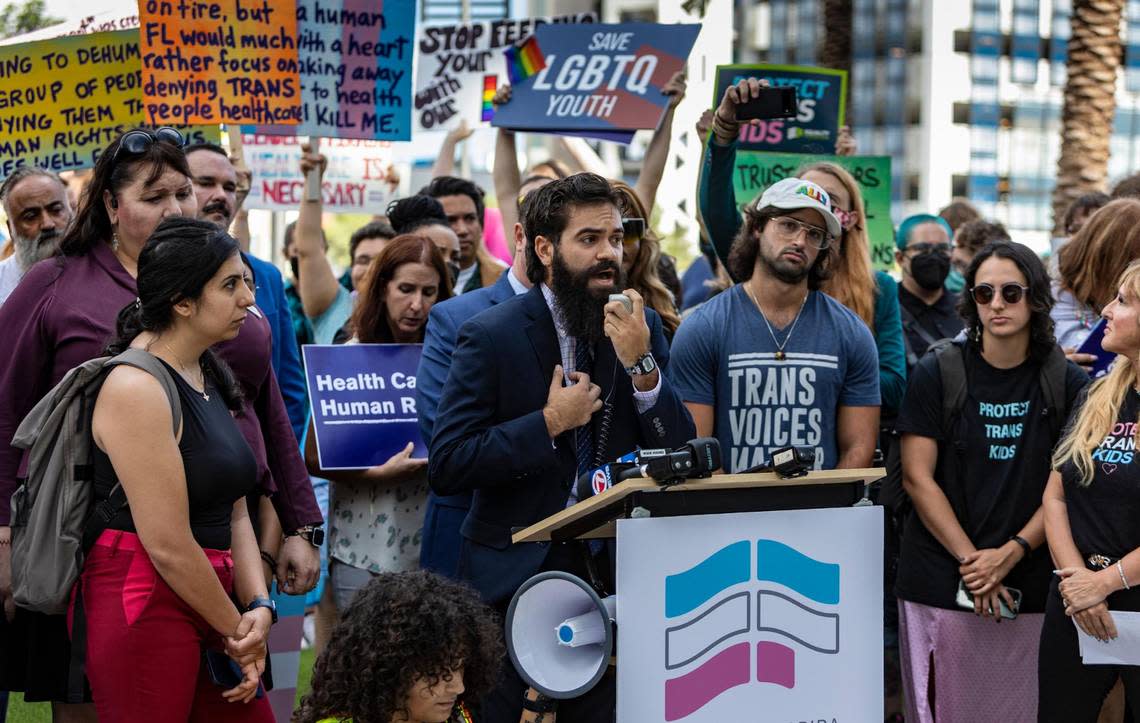Florida House will issue subpoenas to medical groups advocating gender-affirming care

- Oops!Something went wrong.Please try again later.
A Florida House committee voted Monday to authorize sending subpoenas to the Florida chapters of the American Academy of Pediatrics and the American Psychiatric Association, which have both issued guidance in support of gender-affirming care for transgender children.
House Speaker Paul Renner said he wants the House to examine how the organizations adopted their recommendations. He questioned whether the guidelines were the result of scientific analysis or whether “the integrity of the medical profession has been compromised by a radical gender ideology that stands to cause permanent physical and mental harm to children and adolescents.”
Saying that organizations in favor of gender-affirming care have so far fought “vigorously” to avoid any “meaningful inquiry or disclosure” about how they reached their standards, Renner directed the House Health and Human Services Committee, led by chairperson Randy Fine, R-Palm Bay, to begin an investigation.
The House Health and Human Services Committee voted 13-6 to authorize Fine to write and issue subpoenas for the Florida chapter of the American Academy of Pediatrics and the Florida Psychiatric Society, a branch of the American Psychiatric Association.
Subpoenas from the House can go only to Florida organizations. Fine said he would have liked to subpoena other groups, including the World Professional Association for Transgender Health.
Fine said he hopes to get responses before the end of the legislative session, which is scheduled to end on May 5.
“One would believe that if they have nothing to hide, they won’t hesitate to provide that information,” Fine said.
A spokesperson for the Florida chapter of the American Academy of Pediatrics declined to comment. The Florida Psychiatric Society did not return a request for comments Monday afternoon.
Both the American Academy of Pediatrics and the American Psychiatric Association have issued guidelines that support affirming care for minors with gender dysphoria, which is the distress felt when someone’s gender expression does not match their gender identity. The pediatric association endorses “developmentally appropriate” care, including puberty blockers during puberty development, hormone therapies in adolescence and surgeries typically for adults. It said surgeries should be evaluated on a case-by-case basis for adolescents in consideration with their families and medical and mental-health providers.
The American Psychiatric Association’s guidance says psychiatrists working with transgender and gender-diverse youth are encouraged to become familiar with medical-treatment options, such as hormone therapies, and work alongside medical providers to provide the best care.
In the last year, Gov. Ron DeSantis’ administration and the Legislature have taken several steps that conflict with those recommendations.
The state Board of Medicine and Board of Osteopathic Medicine have prohibited medical treatments, including puberty blockers and hormone therapies for children with gender dysphoria. The House and Senate have passed bills that would codify that rule. And Florida’s Agency for Health Care Administration prohibits Medicaid from funding such treatments.
Renner, R-Palm Coast, said in a letter to the House committee that the question of how the organizations came to support medical care for transgender minors has been a question in the ongoing litigation about Florida’s Medicaid rule.
In a tweet announcing he had signed the subpoenas, Fine wrote that he was demanding materials from the organizations “justifying their recommendation that castrating and mutilating children is ‘gender-affirming care.’ ”
Several Florida Republicans have pointed to European studies that they say raise concern about medical treatments for gender dysphoria. But experts say the treatments are largely safe and warn that leaving children without treatment for their gender dysphoria could lead to serious mental-health struggles, including suicide. And some medical experts feel the state is being selective in which studies it lends credence to.
Rep. Ashley Gantt, D-Miami, said she worried the subpoenas were reminiscent of the Johns Committee, a legislative committee that sought to investigate communists and LGBTQ+ people in Florida universities.
Rep. Fentrice Driskell, the House Democratic leader, said that because the House has already passed its bill dealing with medical care for transgender children, the subpoena doesn’t serve a legitimate purpose.
“We’re very concerned this could be a political witch hunt,” she said.
The Florida House does have the power to issue subpoenas, and those who choose not to appear can be punished by a fine or imprisonment, but the imprisonment cannot go beyond the length of the final adjournment of the legislative session, according to state statutes.
Outside of session, someone who ignored a subpoena from the House can be held in contempt of court if committee members file a complaint.
This story was updated to correct the name of the The Florida Psychiatric Society, a branch of the American Psychiatric Association.
